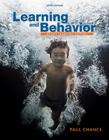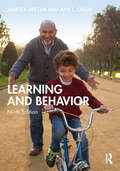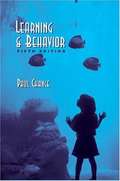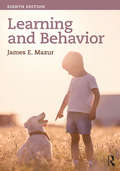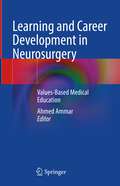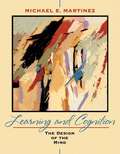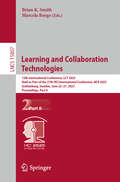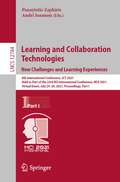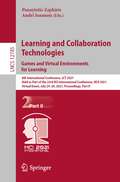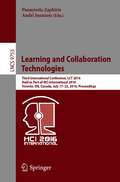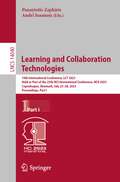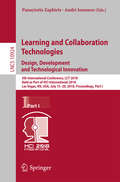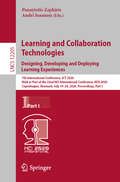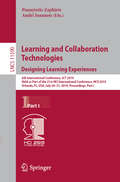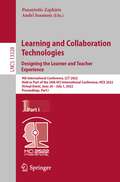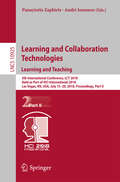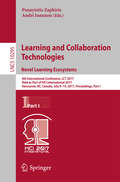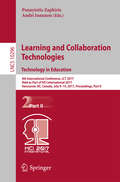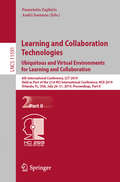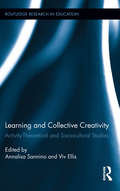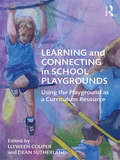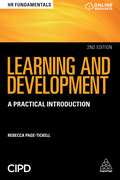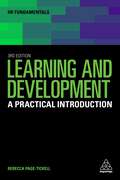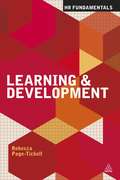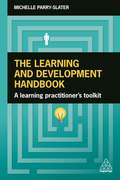- Table View
- List View
Learning and Behavior: Active Learning Edition (6th edition)
by Paul ChanceThis undergraduate textbook introduces the natural science approach to behavior and describes the efforts of researchers to understand the kinds of experiences that produce learning, the circumstances under which learning in one situation carries over to another situation, the effects of different reinforcement schedules, the durability of learned behavior, and the limitations of learning.
Learning and Behavior
by James E. Mazur Amy L. OdumLearning and Behavior reviews how people and animals learn and how their behaviors are changed because of learning. It describes the most important principles, theories, controversies, and experiments that pertain to learning and behavior that are applicable to diverse species and different learning situations. Both classic studies and recent trends and developments are explored, providing a comprehensive survey of the field. Although the behavioral approach is emphasized, many cognitive theories are covered as well, along with a chapter on comparative cognition. Real-world examples and analogies make the concepts and theories more concrete and relevant to students. In addition, most chapters provide examples of how the principles covered have been employed in applied and clinical behavior analysis. The text proceeds from the simple to the complex. The initial chapters introduce the behavioral, cognitive, and neurophysiological approaches to learning. Later chapters give extensive coverage of classical conditioning and operant conditioning, beginning with basic concepts and findings and moving to theoretical questions and current issues. Other chapters examine the topics of reinforcement schedules, avoidance and punishment, stimulus control and concept learning, observational learning and motor skills, comparative cognition, and choice. Thoroughly updated, each chapter features many new studies and references that reflect recent developments in the field. Learning objectives, bold-faced key terms, practice quizzes, a chapter summary, review questions, and a glossary are included. The text is intended for undergraduate or graduate courses in psychology of learning, (human) learning, introduction to learning, learning processes, animal behavior, (principles of) learning and behavior, conditioning and learning, learning and motivation, experimental analysis of behavior, behaviorism, and behavior analysis.
Learning and Behavior (5th edition)
by Paul ChancePer the author: The theme of this edition is that learning is a biological mechanism that aids survival. My goal was to write a text that would cover the course contents in the theory and research of behavior and learning. This book is an instructional tool, not a reference book.
Learning and Behavior (8th Edition): Eighth Edition
by James E. Mazur<p>This book reviews how people and animals learn and how their behaviors are changed as a result of learning. It describes the most important principles, theories, controversies, and experiments that pertain to learning and behavior that are applicable to diverse species and different learning situations. Both classic studies and recent trends and developments are explored, providing a comprehensive survey of the field. <p>Although the behavioral approach is emphasized, many cognitive theories are covered as well, along with a chapter on comparative cognition. Real-world examples and analogies make the concepts and theories more concrete and relevant to students. In addition, most chapters provide examples of how the principles covered have been applied in behavior modification and therapy. <p>Thoroughly updated, each chapter features many new studies and references that reflect recent developments in the field. Learning objectives, bold-faced key terms, practice quizzes, a chapter summary, review questions, and a glossary are included. <p>The volume is intended for undergraduate or graduate courses in psychology of learning, (human) learning, introduction to learning, learning processes, animal behavior, (principles of) learning and behavior, conditioning and learning, learning and motivation, experimental analysis of behavior, behaviorism, and behavior analysis.</p>
Learning and Career Development in Neurosurgery: Values-Based Medical Education
by Ahmed AmmarThe neurosurgical, surgical and medical training and practice models have to keep up with the technological revolution in the 21st Century as our lives changed on a swift base. Making bioethics and metacognition a cornerstone in medical education and practice will flourish our humane societies. Metacognition is thinking about one’s thinking, to plan, monitor and assess one’s understanding and performance. By adherence to medical ethics and Values-Based Medicine (VsBM) as guiding principles, we can develop benevolent medical practice. To enhance knowledge application, skills, and character qualities in realms beyond the immediate context in which they were learned. In this book, we developed a framework on how to evolve medical education and training by utilizing hi-tech. We divided the book into five principal components; Current and traditional root analysis of the learning process, Ethics and metacognition of education, learning and career development, Obstacles, difficulties and setbacks in learning and career development process, Learning in the digital era, and Mentorship. The author believes we are entering a new era of information technology, which will have a significant impact on the education, sciences, strategies and philosophy. Therefore, in preparation for this colossal transformation, the author brings together the best brains in the neurosurgical field from around the globe. Twenty distinguished Professors of Neurosurgery and educators from Canada, the USA, Colombia, the UK, Italy, the Netherland, India, Japan, China, Rwanda, Egypt and Saudi Arabia gathered their experiences and thoughts in this book to shade light on an evolving world that will be the norm in near future.
Learning and Cognition: The Design of the Mind
by Michael E. MartinezWhat is the design of the mind? What does that design imply for education? This comprehensive and engaging introduction to human learning and its applications to education focuses on these vital questions by exploring the theories of knowledge, complex cognition, and human intelligence, presenting a clear and interesting overview of the human mind through multiple theoretical lenses. The author delineates how the mind has a clear design, or architecture, that explains simple acts of memory and complex cognition, to highly creative acts and leaps of scientific or artistic insight. Topics covered throughout the text include: memory, motivation, cognitive development, the brain, and intelligence. Unique to this text, the author has provided an interdisciplinary chapter dedicated to theories of knowledge, extended coverage of expert-novice differences and talent development, and a chapter devoted to intelligence. Readers will appreciate special features like Learning Strategies which cover specific application of the theories to classroom practice, and Interest Magnets which explore fascinating topics such as photographic memory, sleep learning, and Einstein's brain. Written like a narrative, Learning and Cognition: The Design of the Mind will delight its readers' interest and attention as they learn about the theories of human learning and cognition and the improvement of the mind through education.
Learning and Collaboration Technologies: 12th International Conference, LCT 2025, Held as Part of the 27th HCI International Conference, HCII 2025, Gothenburg, Sweden, June 22–27, 2025, Proceedings, Part II (Lecture Notes in Computer Science #15807)
by Brian K. Smith Marcela BorgeThe three-volume set LNCS 15806–15808 constitutes the thoroughly refereed proceedings of the 12th International Conference on Learning and Collaboration Technologies, LCT 2025, held as part of the 27th International Conference, HCI International 2025, which took place in Gothenburg, Sweden, June 22-17, 2025. The total of 1430 papers and 355 posters included in the HCII 2025 proceedings was carefully reviewed and selected from 7972 submissions. The papers have been organized in topical sections as follows: Part I: Designing Learning Experiences; Technological Innovation in EducationPart II: From Human Teachers to AI Educators; Intelligent Learning Environments Part III: Serious Games and Gamification; Immersive Learning; Understanding Learning Experiences
Learning and Collaboration Technologies: 8th International Conference, LCT 2021, Held as Part of the 23rd HCI International Conference, HCII 2021, Virtual Event, July 24–29, 2021, Proceedings, Part I (Lecture Notes in Computer Science #12784)
by Panayiotis Zaphiris Andri IoannouThis two-volume set LNCS 12784 and 12785 constitutes the refereed proceedings of the 8th International Conference on Learning and Collaboration Technologies, LCT 2021, held as Part of the 23rd International Conference, HCI International 2021, which took place in July 2021. Due to COVID-19 pandemic the conference was held virtually.The total of 1276 papers and 241 poster papers included in the 39 HCII 2021 proceedings volumes was carefully reviewed and selected from 5222 submissions. The regular papers of LCT 2021, Part I, are organized in topical sections named: Designing and Developing Learning Technologies; Learning, Teaching and Collaboration Experiences; On-line vs. in Class Learning in Pandemic Times.
Learning and Collaboration Technologies: 8th International Conference, LCT 2021, Held as Part of the 23rd HCI International Conference, HCII 2021, Virtual Event, July 24–29, 2021, Proceedings, Part II (Lecture Notes in Computer Science #12785)
by Panayiotis Zaphiris Andri IoannouThis two-volume set LNCS 12774 and 12775 constitutes the refereed proceedings of the 8th International Conference on Learning and Collaboration Technologies, LCT 2021, held as Part of the 23rd International Conference, HCI International 2021, which took place in July 2021. Due to COVID-19 pandemic the conference was held virtually. The total of 1276 papers and 241 poster papers included in the 39 HCII 2021 proceedings volumes was carefully reviewed and selected from 5222 submissions. The regular papers of LCT 2021, Part II, focus on Games and Gamification in Learning; Chatbots in Learning; AR, VR and Robots in Learning.
Learning and Collaboration Technologies: Third International Conference, LCT 2016, Held as Part of HCI International 2016, Toronto, ON, Canada, July 17-22, 2016, Proceedings (Lecture Notes in Computer Science #9753)
by Panayiotis Zaphiris Andri IoannouThis book constitutes the refereed proceedings of the Third International Conference on Learning and Collaboration Technologies, LCT 2016, held as part of the 18th International Conference on Human-Computer Interaction, HCII 2016, in Toronto, Canada, in July 2016, in conjunction with 14 thematically similar conferences. The 1287 papers presented at the HCII 2016 conferences were carefully reviewed and selected from 4354 submissions. The papers cover the entire field of human-computer interaction, addressing major advances in knowledge and effective use of computers in a variety of application areas. The papers included in this volume are organized in the following thematic sections: instructional design; interaction techniques and platforms for learning; learning performance; web-based, mobile and ubiquitous learning; intelligent learning environments; learning technologies; collaboration technologies; and cultural and social aspects of learning and collaboration technologies.
Learning and Collaboration Technologies: 10th International Conference, LCT 2023, Held as Part of the 25th HCI International Conference, HCII 2023, Copenhagen, Denmark, July 23–28, 2023, Proceedings, Part I (Lecture Notes in Computer Science #14040)
by Panayiotis Zaphiris Andri IoannouThis two-volume set of LCT 2023, constitutes the refereed proceedings of the 10th International Conference on Learning and Collaboration Technologies, LCT 2023, held as Part of the 24th International Conference, HCI International 2023, which took place in July 2023 in Copenhagen, Denmark.The total of 1578 papers and 396 posters included in the HCII 2023 proceedings volumes was carefully reviewed and selected from 7472 submissions. The papers of LCT 2022 Part I are organized in topical sections named: Designing Learning Experiences; Understanding the Learning Experience; Technology-supported Teaching; Supporting Creativity in Learning.
Learning and Collaboration Technologies. Design, Development and Technological Innovation: 5th International Conference, LCT 2018, Held as Part of HCI International 2018, Las Vegas, NV, USA, July 15-20, 2018, Proceedings, Part I (Lecture Notes in Computer Science #10924)
by Panayiotis Zaphiris Andri IoannouThis two-volume set LNCS 10924 and 10925 constitute the refereed proceedings of the 5th International Conference on Learning and Collaboration Technologies, LCT 2018, held as part of the 20th International Conference on Human-Computer Interaction, HCII 2018, in Las Vegas, NV, USA in July 2018. The 1171 papers presented at HCII 2018 conferences were carefully reviewed and selected from 4346 submissions. The papers cover the entire field of human-computer interaction, addressing major advances in knowledge and effective use of computers in a variety of applications areas. The papers in this volume are organized in the following topical sections: designing and evaluating systems and applications, technological innovation in education, learning and collaboration, learners, engagement, motification, and skills, games and gamification of learning, technology-enhanced teaching and assessment, computing and engineering education.
Learning and Collaboration Technologies. Designing, Developing and Deploying Learning Experiences: 7th International Conference, LCT 2020, Held as Part of the 22nd HCI International Conference, HCII 2020, Copenhagen, Denmark, July 19–24, 2020, Proceedings, Part I (Lecture Notes in Computer Science #12205)
by Panayiotis Zaphiris Andri IoannouThis two-volume set LNCS 12205 and LNCS 12206 constitutes the proceedings of the 7th International Conference on Learning and Collaboration Technologies, LCT 2020, held as part of the 22nd International Conference, HCI International 2020, which took place in Copenhagen, Denmark, in July 2020.The total of 1439 papers and 238 posters included in the 37 HCII 2020 proceedings volumes was carefully reviewed and selected from 6326 submissions.The papers in this volume are organized in the following topical sections: designing and evaluating learning experiences; learning analytics, dashboards and learners models; language learning and teaching; and technology in education: policies and practice. As a result of the Danish Government's announcement, dated April 21, 2020, to ban all large events (above 500 participants) until September 1, 2020, the HCII 2020 conference was held virtually.
Learning and Collaboration Technologies. Designing Learning Experiences: 6th International Conference, LCT 2019, Held as Part of the 21st HCI International Conference, HCII 2019, Orlando, FL, USA, July 26–31, 2019, Proceedings, Part I (Lecture Notes in Computer Science #11590)
by Panayiotis Zaphiris Andri IoannouThis two-volume set LNCS 11590 and 11591 constitutes the refereed proceedings of the 6th International Conference on Learning and Collaboration Technologies, LCT 2019, held as part of the 21st International Conference on Human-Computer Interaction, HCII 2019, in Orlando, FL, USA in July 2019. The 1274 full papers and 209 posters presented at the HCII 2019 conferences were carefully reviewed and selected from 5029 submissions. The papers cover the entire field of human-computer interaction, addressing major advances in knowledge and effective use of computers in a variety of applications areas. The papers in this volume are organized in the following topical sections: designing and evaluating learning experiences; theoretical and pedagogical approaches in technology-enhanced learning; cognitive and psychological issues in learning; and technology in STEM education.
Learning and Collaboration Technologies. Designing the Learner and Teacher Experience: 9th International Conference, LCT 2022, Held as Part of the 24th HCI International Conference, HCII 2022, Virtual Event, June 26 – July 1, 2022, Proceedings, Part I (Lecture Notes in Computer Science #13328)
by Panayiotis Zaphiris Andri IoannouThis proceedings, LCT 2022, constitutes the refereed proceedings of the 9th International Conference on Learning and Collaboration Technologies, LCT 2022, held as Part of the 24th International Conference, HCI International 2022, which took place in June/July 2022. Due to COVID-19 pandemic the conference was held virtually.The total of 1271 papers and 275 poster papers included in the 39 HCII 2022 proceedings volumes was carefully reviewed and selected from 5487 submissions. The papers of LCT 2022 are organized in topical sections named: Designing and Developing Learning Technologies; Learning and Teaching Online; Diversity in Learning; Technology in Education: Practices and Experiences.
Learning and Collaboration Technologies. Learning and Teaching: 5th International Conference, LCT 2018, Held as Part of HCI International 2018, Las Vegas, NV, USA, July 15-20, 2018, Proceedings, Part II (Lecture Notes in Computer Science #10925)
by Panayiotis Zaphiris Andri IoannouThis two-volume set LNCS 10924 and 10925 constitute the refereed proceedings of the 5th International Conference on Learning and Collaboration Technologies, LCT 2018, held as part of the 20th International Conference on Human-Computer Interaction, HCII 2018, in Las Vegas, NV, USA in July 2018. The 1171 papers presented at HCII 2018 conferences were carefully reviewed and selected from 4346 submissions. The papers cover the entire field of human-computer interaction, addressing major advances in knowledge and effective use of computers in a variety of applications areas. The papers in this volume are organized in the following topical sections: designing and evaluating systems and applications, technological innovation in education, learning and collaboration, learners, engagement, motification, and skills, games and gamification of learning, technology-enhanced teaching and assessment, computing and engineering education.
Learning and Collaboration Technologies. Novel Learning Ecosystems
by Panayiotis Zaphiris Andri IoannouThe two-volume set LNCS 10295 and 10296 constitute the refereed proceedings of the 4th International Conference on Learning and Collaboration Technologies, LCT 2017, held as part of the 19th International Conference on Human-Computer Interaction, HCII 2017, in Vancouver, BC, Canada, in July 2017, in conjunction with 15 thematically similar conferences. The 1228 papers presented at the HCII 2017 conferences were carefully reviewed and selected from 4340 submissions.The papers cover the entire field of human-computer interaction, addressing major advances in knowledge and effective use of computers in a variety of application areas. The papers included in this volume are organized in the following topical sections: multimodal and natural interaction for learning; learning and teaching ecosystems; e-learning, social media and MOOCs; beyond the classroom; and games and gamification for learning.
Learning and Collaboration Technologies. Technology in Education
by Panayiotis Zaphiris Andri IoannouThe two-volume set LNCS 10295 and 10296 constitute the refereed proceedings of the 4th International Conference on Learning and Collaboration Technologies, LCT 2017, held as part of the 19th International Conference on Human-Computer Interaction, HCII 2017, in Vancouver, BC, Canada, in July 2017, in conjunction with 15 thematically similar conferences. The 1228 papers presented at the HCII 2017 conferences were carefully reviewed and selected from 4340 submissions.The papers cover the entire field of human-computer interaction, addressing major advances in knowledge and effective use of computers in a variety of application areas. The papers included in this volume are organized in the following topical sections: STEM education; diversity in learning; learning analytics; and improving the learning and collaboration experience.The chapter 'The Quality of MOOCs: How to Improve the Design of Open Education and Online Courses for Learners?' is Open Access under a CC BY 4.0 license.
Learning and Collaboration Technologies. Ubiquitous and Virtual Environments for Learning and Collaboration: 6th International Conference, LCT 2019, Held as Part of the 21st HCI International Conference, HCII 2019, Orlando, FL, USA, July 26–31, 2019, Proceedings, Part II (Lecture Notes in Computer Science #11591)
by Panayiotis Zaphiris Andri IoannouThis two-volume set LNCS 11590 and 11591 constitutes the refereed proceedings of the 6th International Conference on Learning and Collaboration Technologies, LCT 2019, held as part of the 21st International Conference on Human-Computer Interaction, HCII 2019, in Orlando, FL, USA in July 2019. The 1274 full papers 209 posters presented at the HCII 2019 conferences were carefully reviewed and selected from 5029 submissions. The papers cover the entire field of human-computer interaction, addressing major advances in knowledge and effective use of computers in a variety of applications areas. The papers in this volume are organized in the following topical sections: mobile and ubiquitous learning; virtual reality and augmented reality systems for learning; and collaborative technology.
Learning and Collective Creativity: Activity-Theoretical and Sociocultural Studies (Routledge Research in Education)
by Viv Ellis Annalisa SanninoThis book brings together leading representatives of activity-theoretically-oriented and socioculturally-oriented research around the world, to discuss creativity as a collective endeavour strongly related to learning to face the societal challenges of our world. As history shows, major accomplishments in arts and technological innovations have allowed us to see the world differently and to identify new learning perspectives for the future which were seldom limited to individual action or isolated activities. This book, while primarily focused on educational insitutions, extends its examination of creativity and learning to include other settings (such as government agencies) beyond the limits of schooling.
Learning and Connecting in School Playgrounds: Using the Playground as a Curriculum Resource
by Llyween Couper Dean SutherlandPlay is critical to children’s well-being and development. All students should have access to and adequate time for positive play experiences every day. Learning and Connecting in School Playgrounds invites parents, teachers, principals and education administrators to take another look at their school playgrounds as spaces crucial to learning, well-being and development. This book combines research findings, commentary and the authors’ personal experiences and observations together with the views of teachers, principals, parents and students related to play and play spaces. Key content includes consideration of the role of adults in the school playground, the influence of technology on play, the challenges experienced by children transitioning to new school environments and consideration of strategies to support students’ access and participation in the playground. Cases are presented to illustrate the use of an audit tool to enhance school playgrounds. The future of school playgrounds is also considered through the reported hopes and dreams of adults and students and a range of recommendations are made for the review and development of schools’ outdoor play spaces. Learning and Connecting in School Playgrounds is written with a sense of urgency, calling for the recognition of positive play experiences as invaluable to children’s education. It includes important and challenging insights to inform and guide decision-making and will be an essential resource for all stakeholders who share responsibility for children’s participation and learning during school break-times.
Learning and Development: A Practical Introduction (HR Fundamentals #7)
by Rebecca Page-TickellIn today's complex, uncertain and ambiguous business environment, it is essential to develop a workforce's capabilities, skills and competencies to ensure continued organizational success. Learning and Development is a practical guide to the principles of effectively designing and delivering training and L&D programmes in organizations of any size. It demonstrates how to link learning to strategic business goals and explores the benefits of L&D and the complexities associated with it. Using a combination of diagnostic tools, scenarios and case studies, this essential book builds knowledge in areas including identifying L&D needs, selecting the most appropriate types of intervention and the processes of measurement and evaluation.This updated second edition of Learning and Development covers the latest trends and developments in the field, such as e-learning, gamification and massive open online courses (MOOCs), as well as new material on learning measurement and additional international case studies.HR Fundamentals is a series of succinct, practical guides for students and those in the early stages of their HR careers. They are endorsed by the Chartered Institute of Personnel and Development (CIPD), the UK professional body for HR and people development, which has over 145,000 members worldwide.
Learning and Development: A Practical Introduction (HR Fundamentals #25)
by Rebecca Page-TickellHow can learning initiatives contribute to employee and organizational success? This is a practical introduction to the principles of designing and delivering effective training and L&D programmes. Providing diagnostic tools, scenarios and case studies, Learning and Development demonstrates how to link learning to strategic business goals and explores both the benefits and complexities associated with L&D. This updated third edition features a new chapter on designing learning interventions, covering technology-led development and the impact of virtual learning. There is also guidance on making learning and development strategies accessible and inclusive for all employees, and information on metrics that can be used for measuring effectiveness.Learning and Development features guidance in essential areas including identifying L&D needs, selecting the most appropriate types of intervention and the processes of measurement and evaluation. Online resources include extended case studies, an annotated literature review and self-evaluation tools.HR Fundamentals is a series of succinct, practical guides featuring exercises, examples and case studies. They are ideal for students and those in the early stages of their HR careers.
Learning and development
by Rebecca Page-TickellTailored to the needs of HR and learning and development (L&D) practitioners, this book offers an overview of the field that is strongly aligned to organizational strategies and objectives. Using a combination of practical tools, assessments, scenarios and international case studies, this handbook builds readers' knowledge of the area -- from diagnosing L&D needs and types of intervention and development categories, to assessment and training evaluation. Page-Tickell provides the skills needed to implement a successful L&D strategy in any type of organization.
The Learning and Development Handbook: A Learning Practitioner's Toolkit
by Michelle Parry-SlaterThe skills needed in today's business world are not the same as they were in the past. Therefore, upskilling, reskilling and developing staff has never been more important. However, classroom training isn't the best way to achieve this with employees forgetting more than 70% of what they've been taught within just one day. Learning outside the workplace is social, digital and immediate and companies need to embrace this to achieve the productivity, performance and revenue benefits that come from effective learning. The Learning and Development Handbook is a practical guide for L&D professionals wanting to move away from traditional classroom teaching but not sure where to start. Full of practical tips and advice, this is urgent reading for anyone in the learning profession.The Learning and Development Handbook includes advice on how to embed social and digital learning, make the most of blended learning, adopt brain-friendly learning and design more effective learning content for improved employee engagement and performance. This book also provides guidance on how to identify learning needs in an organization, gather evidence to engage stakeholders and align L&D strategy with overall business strategy. There is also expert guidance on how to evaluate and measure the effectiveness of learning, where to find the data needed to support learning activity. Written by an L&D practitioner, for L&D practitioners, this book is packed full of tips, hints, tools and models that can be used to improve both employee and overall business performance in the immediate, middle-term and long-term future.
